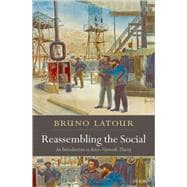
Note: Supplemental materials are not guaranteed with Rental or Used book purchases.
Purchase Benefits
What is included with this book?
| Acknowledgements | p. ix |
| Introduction: How to Resume the Task of Tracing Associations | p. 1 |
| How to Deploy Controversies About the Social World | |
| Learning to Feed off Controversies | p. 21 |
| First Source of Uncertainty: No Group, Only Group Formation | p. 27 |
| Second Source of Uncertainty: Action Is Overtaken | p. 43 |
| Third Source of Uncertainty: Objects too Have Agency | p. 63 |
| Fourth Source of Uncertainty: Matters of Fact vs. Matters of Concern | p. 87 |
| Fifth Source of Uncertainty: Writing Down Risky Accounts | p. 121 |
| On the Difficulty of Being an ANT: An Interlude in the Form of a Dialog | p. 141 |
| How to Render Associations Traceable Again | |
| Why is it so Difficult to Trace the Social? | p. 159 |
| How to Keep the Social Flat | p. 165 |
| First Move: Localizing the Global | p. 173 |
| Second Move: Redistributing the Local | p. 191 |
| Third Move: Connecting Sites | p. 219 |
| Conclusion: From Society to Collective-Can the Social Be Reassembled? | p. 247 |
| Bibliography | p. 263 |
| Index | p. 281 |
| Table of Contents provided by Ingram. All Rights Reserved. |
The New copy of this book will include any supplemental materials advertised. Please check the title of the book to determine if it should include any access cards, study guides, lab manuals, CDs, etc.
The Used, Rental and eBook copies of this book are not guaranteed to include any supplemental materials. Typically, only the book itself is included. This is true even if the title states it includes any access cards, study guides, lab manuals, CDs, etc.